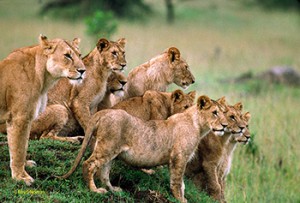Editor's Note: The Adventure Travel Trade Association has previously published two articles on this issue. The first, published in June 2010, was An ATTA Call to Action, detailing our support of this cause along with supporting background information.
The second, published in August, provides an Economic Impact Statement by Save the Serengeti, which clearly demonstrates how the highway would also have negative and likely permanent consequences on the Tanzanian wildlife inhabitants and consequently, its tourism industry, which plays a key role in the country’s economy

290 Scientists from 32 countries have signed a petition asking the government of Tanzania choose an alternate route around the Serengeti National Park, rather than building one through it.
The petition is a reaction to the announced plans of the Tanzanian government to build a commercial route across the northern part of the Serengeti National Park.
International and conservation organizations, the travel industry, and the public have protested the decision. Now scientists are speaking out. The petition, and accompanying survey, follows an article in the scientific journal, Nature, in which 27 leading scientists described the destruction the road would cause.
The Petition of scientists states:
“Evidence from other parts of the world, combined with our deep understanding of the Serengeti ecosystem, makes it clear – the road will result in severe, negative, irreversible impacts, with little mitigation possible.”
The petition reiterates warnings by the UNESCO World Heritage Committee in July of this year about specific negative impacts of the highway and adds,
“The proposed road cuts through a critical wilderness area that is essential to the migration. The type of road surface matters little. The migration itself could easily collapse, with a devastating effect on all wildlife, the grasslands, and the entire ecosystem.”
It concludes by asking that an alternative highway be found:
“The government of Tanzania has to work for development and welfare in all areas of the country. But there is no need to sacrifice its most precious wilderness, or its income from tourism, or its heritage of conservation. An alternative can and must be found.”
“Scientists, government officials, engineers, conservationists, economists, aid and lending institutions - all can  study and work together to both protect the environment and help the people. This task is critical for both Tanzania and the world.”
study and work together to both protect the environment and help the people. This task is critical for both Tanzania and the world.”
Included in the petition is a survey about likely negative impacts. Results clearly show that scientists believe these to be extremely serious. Many, in fact, concluded that the collapse of the wildebeest migration was likely or even inevitable. Results of the survey on impacts are:
In your opinion, how likely are the following:
Combined % Saying Inevitable, Extremely Likely, Very Likely
Disruption and obstruction of migration routes: 85%
57% said it would be inevitable. 28% said extremely likely.
Introduction of invasive plants, animals, and disease: 91%
35% said inevitable. 67% said very likely or extremely likely.
Increased mortality due to wildlife-vehicle collisions: 98%
67% said inevitable. 21% said extremely likely.
Intensive, organized poaching, especially reintroduced rhino: 88%
32% said inevitable. 38% said extremely likely.
Loss of habitat from human settlement and agriculture: 87%
40% said inevitable. 32% said extremely likely.
Eventual collapse of migration:
54% said very or extremely likely. 17% said inevitable. 71%
Respondents also wrote about their professional experiences and opinions:
Dr. Anne Pusey, a professor at Duke University who studied lions in the Serengeti for ten years, wrote: “The Serengeti is a unique and precious ecosystem - one of the very few large scale migratory systems of large animals remaining on the planet…A road across the migratory routes will devastate the system for all the reasons listed in this [petition] letter and survey. “
Traci Birge, a researcher from Finland echoed the thoughts of many in saying, “the proposed highway route would be devastating for the ecology of the Serengeti, and would have long-term negative effects on local residents, wildlife and ecology and would be a terrible blow for global biodiversity.”
Scientists, including top experts in their field, are from more than fifty different universities, research, and conservation organizations. Scientific fields represented included: Wildlife Biology, Conservation Biology, Zoology, Population Ecology, Reproductive Biology, Wildlife Epidemiology, and Biodiversity Management.
Among the 32 countries represented are: UK, USA, Norway, Sweden, Hungary, Israel, Finland and Australia, and the African countries of South Africa, Zambia, Zimbabwe, Ethiopia, Namibia, Kenya, and Tanzania.
The petition and survey were conducted by Save the Serengeti, a nonprofit organization.
Results of the petition and survey, including petitioners names, organizations, countries, and detailed written responses can be found at: http://www.savetheserengeti.org/?p=417
Download the entire October 2010 Environmental Impact Statement and Petition and Survey from 290 International Scientists from 32 countries.
Contact:
